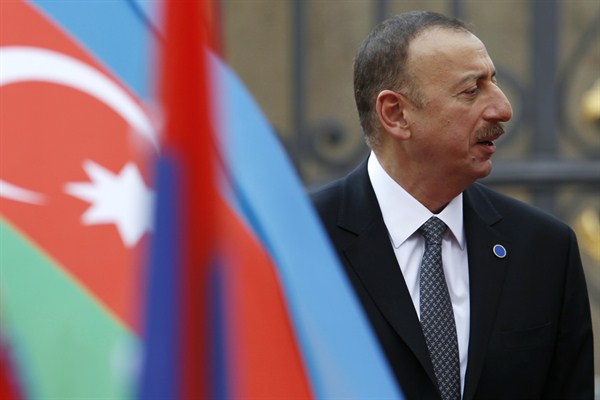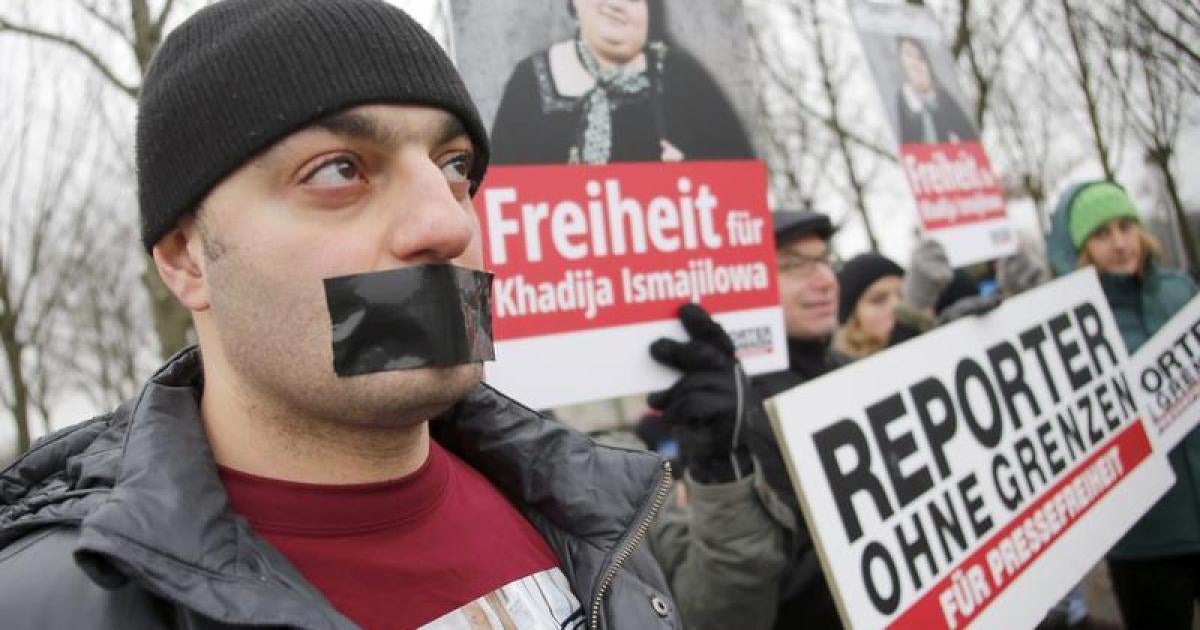Re: Azerbaijan - Internal Political Affairs
After ‘Wasted’ Boom Years, Azerbaijan Pays the Price of Energy-Revenue Dependency
The Editors Monday, Jan. 25, 2016
\
In mid-January, protests in Azerbaijan against price hikes and a collapse in the country’s currency were broken up forcefully by security forces, resulting in the arrest of 55 people. In an email interview, Richard D. Kauzlarich, the co-director of the Center for Energy Science and Policy at George Mason University who also served as the U.S. ambassador to Azerbaijan from 1994 to 1997, explains the impact of the collapse of global energy prices on Azerbaijan’s economy.
WPR: How important are commodities for Azerbaijan’s economy, and what effect have falling commodities prices had on public spending and, by consequence, political stability?
Richard D. Kauzlarich: Despite President Ilham Aliyev’s claims to the contrary, the current state of the Azerbaijani economy reflects two decades of dependence on energy earnings based on the coincidence of high energy prices and peak production from existing oil and gas deposits. If there was growth in the non-oil sector, it was fed by energy earnings transferred to the construction, banking and telecommunications sectors. This was made evident when, after oil prices fell by more than 50 percent, Azerbaijan was forced to devalue its currency, the manat, to curb the hemorrhage of foreign exchange. Emergency actions were also needed to shore up failing banks and prevent public panic, as citizens sought to withdraw deposits for foreign exchange. Resulting social unrest provoked a couple of Cabinet meetings to discuss recalculating the budget based on oil prices that have now dipped to below $30 a barrel. A flurry of presidential “orders” also introduced a series of 10-percent increases in pensions and other wages, and price controls designed to counter spreading popular unease over the rise in prices of basic commodities like bread.
WPR: How effectively did Azerbaijan use the revenue windfalls of the commodities boom to develop infrastructure and address poverty and social welfare issues?
Kauzlarich: It is unclear how much income Azerbaijan has realized from the energy sector over the past two decades, or how it was spent. Combined revenues over that period probably topped $100 billion. Much went to increased defense expenditures—the regime proudly proclaims Azerbaijan’s defense budget exceeds the entire budget of Armenia; and to mega-construction projects like the Flame Towers, the Heydar Aliyev Center and the Baku Olympic Stadium. Some has gone to road infrastructure, mainly connected with the 2015 Euro Games sites, as well as to port and rail improvements. The remainder has filtered into the hands of the ruling elite through corrupt businesses—especially in the construction, banking and telecoms sectors—and other arrangements. These illicit flows run in the range of tens of billions of dollars. A limited trickle-down effect from all this revenue created a false sense of prosperity in Baku. But behind the walls that line the road from the Baku airport into town, and in the country’s outlying regions, very little of this windfall was seen or felt by most of the population.
WPR: What steps has Azerbaijan taken to diversify its economy?
Kauzlarich: The only cited figures come from government sources. Yet the dramatic impact of the decline in energy prices over the past year on the economy reflects the fact that there has been no significant diversification in export earnings. Diversification in the economy as a whole has come in the construction, banking, high-end retail, tourism and telecoms sectors, which rely on energy-generated resources. The severe crisis in the banking sector shows how fragile the non-energy sector is, and how dependent it is on energy flows. In sum, Azerbaijan wasted a decade of high energy earnings. Rather than diversifying the economy, the money went to defense procurement, prestige projects—and massive corruption.
After ‘Wasted’ Boom Years, Azerbaijan Pays the Price of Energy-Revenue Dependency
The Editors Monday, Jan. 25, 2016
\
In mid-January, protests in Azerbaijan against price hikes and a collapse in the country’s currency were broken up forcefully by security forces, resulting in the arrest of 55 people. In an email interview, Richard D. Kauzlarich, the co-director of the Center for Energy Science and Policy at George Mason University who also served as the U.S. ambassador to Azerbaijan from 1994 to 1997, explains the impact of the collapse of global energy prices on Azerbaijan’s economy.
WPR: How important are commodities for Azerbaijan’s economy, and what effect have falling commodities prices had on public spending and, by consequence, political stability?
Richard D. Kauzlarich: Despite President Ilham Aliyev’s claims to the contrary, the current state of the Azerbaijani economy reflects two decades of dependence on energy earnings based on the coincidence of high energy prices and peak production from existing oil and gas deposits. If there was growth in the non-oil sector, it was fed by energy earnings transferred to the construction, banking and telecommunications sectors. This was made evident when, after oil prices fell by more than 50 percent, Azerbaijan was forced to devalue its currency, the manat, to curb the hemorrhage of foreign exchange. Emergency actions were also needed to shore up failing banks and prevent public panic, as citizens sought to withdraw deposits for foreign exchange. Resulting social unrest provoked a couple of Cabinet meetings to discuss recalculating the budget based on oil prices that have now dipped to below $30 a barrel. A flurry of presidential “orders” also introduced a series of 10-percent increases in pensions and other wages, and price controls designed to counter spreading popular unease over the rise in prices of basic commodities like bread.
WPR: How effectively did Azerbaijan use the revenue windfalls of the commodities boom to develop infrastructure and address poverty and social welfare issues?
Kauzlarich: It is unclear how much income Azerbaijan has realized from the energy sector over the past two decades, or how it was spent. Combined revenues over that period probably topped $100 billion. Much went to increased defense expenditures—the regime proudly proclaims Azerbaijan’s defense budget exceeds the entire budget of Armenia; and to mega-construction projects like the Flame Towers, the Heydar Aliyev Center and the Baku Olympic Stadium. Some has gone to road infrastructure, mainly connected with the 2015 Euro Games sites, as well as to port and rail improvements. The remainder has filtered into the hands of the ruling elite through corrupt businesses—especially in the construction, banking and telecoms sectors—and other arrangements. These illicit flows run in the range of tens of billions of dollars. A limited trickle-down effect from all this revenue created a false sense of prosperity in Baku. But behind the walls that line the road from the Baku airport into town, and in the country’s outlying regions, very little of this windfall was seen or felt by most of the population.
WPR: What steps has Azerbaijan taken to diversify its economy?
Kauzlarich: The only cited figures come from government sources. Yet the dramatic impact of the decline in energy prices over the past year on the economy reflects the fact that there has been no significant diversification in export earnings. Diversification in the economy as a whole has come in the construction, banking, high-end retail, tourism and telecoms sectors, which rely on energy-generated resources. The severe crisis in the banking sector shows how fragile the non-energy sector is, and how dependent it is on energy flows. In sum, Azerbaijan wasted a decade of high energy earnings. Rather than diversifying the economy, the money went to defense procurement, prestige projects—and massive corruption.












Comment